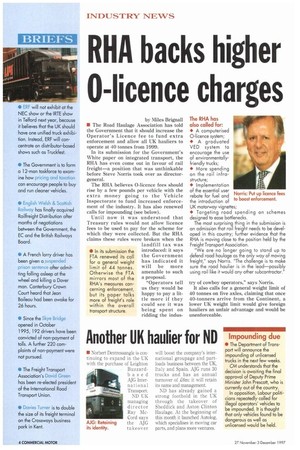RHA backs higher 0-licence charges
Page 6

If you've noticed an error in this article please click here to report it so we can fix it.
by Miles Brignall • The Road Haulage Association has told the Government that it should increase the Operator's Licence fee to fund extra enforcement and allow all UK hauliers to operate at 40 tonnes from 1999.
In its submission for the Government's White paper on integrated transport, the RHA has even come out in favour of rail freight—a position that was unthinkable before Steve Norris took over as directorgeneral.
The RHA believes 0-licence fees should rise by a few pounds per vehicle with the extra money going to the Vehicle Inspectorate to fund increased enforcement of the industry. It has also renewed calls for impounding (see below).
Until now it was understood that Treasury rules would not allow licence fees to be used to pay for the scheme for which they were collected. But the RHA claims these rules were broken when the landfill tax was introduced: it says the Government has indicated it will be more amenable to such a proposal.
"Operators tell us they would be happy to pay a little more if they could see it was being spent on ridding the indus try of cowboy operators," says Norris.
It also calls for a general weight limit of 40 tonnes on five axles, claiming that once 40-tonners arrive from the Continent, a lower UK weight limit would give foreign hauliers an unfair advantage and would be unenforceable. The RHA has also called for:
• A computerised 0-licence system; • A graduated VED system to encourage the use of environmentallyfriendly trucks; • More spending on the rail infrastructure;
• Implementation of the essential user rebate for Fuel and the introduction of UK motorway vignettes; • Targeting road spending on schemes designed to ease bottlenecks.
The most surprising thing in the submission is an admission that rail freight needs to be developed in this country; further evidence that the RHA is moving close to the position held by the Freight Transport Association. "We are no longer going to stand up to defend road haulage as the only way of moving freight," says Norris. "The challenge is to make sure the road haulier is in the lead—possibly using rail like it would any other subcontractor."
• In its submission the FTA renewed its call for a general weight limit of 44 tonnes. Otherwise the ETA mirrors most of the RHA's measures concerning enforcement, but its paper talks more of freight's role within the overall transport structure.








































































































